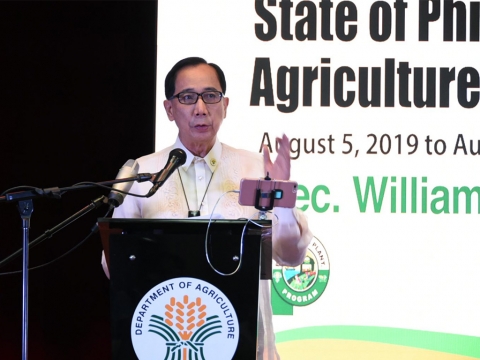DA Secretary William Dar talks about strategies to modernize the rice industry during his State of the Philippine Agriculture Report. (photo by DA)
DILIMAN, Quezon City—Marking his first anniversary in office, Department of Agriculture (DA) Secretary William Dar addressed the nation with his State of the Philippine Agriculture Report.
Dar emphasized the plans and strategies on the implementation of different programs for the sector. These include modernization which aims for the utilization and promotion of new and appropriate technologies in farming and fisheries.
Under this thrust, Dar stressed the need to fast-track the delivery of support in terms of seeds, mechanization, credit, and extension services under the Rice Competitiveness Enhancement Fund (RCEF). These efforts are geared towards improved productivity and modernized rice industry in the country.
Finance Secretary Carlos Dominguez expressed his full support to the vision of the agriculture chief. In his video-streamed speech, he affirmed that both consumers and local farmers are now enjoying benefits from RCEF services.
Dominguez reported that RCEF collections have surpassed the Php10-billion minimum earmark which will translate into subsidies for farmers to improve their yields and mechanize their farms, especially in the identified 57 priority provinces.
“The shift to a tariff-based system is not just working to the benefit both of consumers and our farmers. It will also power a revolution in our agriculture,” he said.
Dominguez also supported the move towards modernization including digitalization of the agricultural systems, mechanization, and other new farming technologies that will help reduce unnecessary costs and losses.
“The only way our agriculture will be competitive is to increasingly mechanize our farm systems, which is why mechanization is the largest component of the RCEF. This will reduce the spillage and spoilage that force up prices of our agricultural produce,” he added.
At present, rice farm machinery and equipment are being distributed by the Philippine Center for Postharvest Development and Mechanization (PHilMech) to eligible farmers’ cooperatives and associations (FCAs). As of August 10, PHilMech has already turned over 500 units of farm machines in six regions which include four-wheel tractors, hand tractors, floating tillers, precision seeders, walk-behind transplanters, reapers, and combine harvesters.
Seed distribution is also ongoing across the country through the Philippine Rice Research Institute (PhilRice). By late June, PhilRice has distributed over 2,125,000 (20-kilogram) bags of certified inbred rice seeds in 55 provinces.
Activities under the RCEF-Extension Program led by the Agricultural Training Institute are also being modified to adapt to the new normal conditions. Various learning approaches are now used for rice specialists, technicians, extension workers, farmers, seed growers, and members of FCAs.
Among the latest training and extension activities are the Farmers’ Field School, training of trainers, and school-on-the-air. Online information caravans, radio programs, and social media campaigns were also launched for targeted RCEF beneficiaries nationwide.
Dar’s State of the Philippine Agriculture Report was held last August 5, 2020 at the Bureau of Soils and Water Management Convention Hall in this city.

